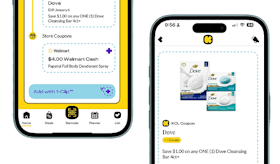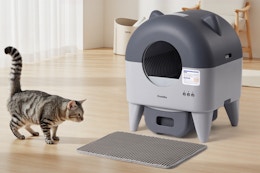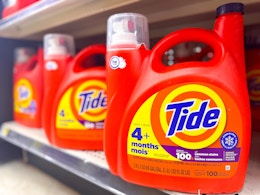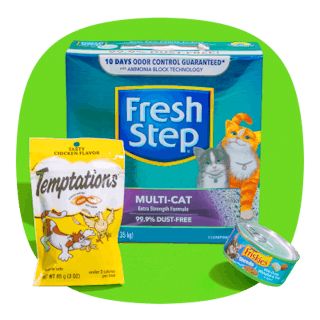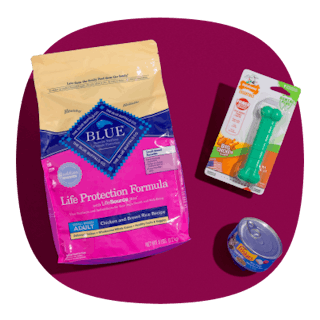Tax season is already a stressful time, so restaurants and businesses help take the edge off by offering Tax Day freebies. Tax Day happens every April 15 (unless it falls on a weekend), and next year, Tax Day will happen on Wednesday, April 15, 2026.
Like in previous years, we expect to see plenty of April food deals, including some just on Tax Day in celebration of completing your taxes. Plus, we’ve got even more ways you can save when you take advantage of Tax Day deals, including tax software and more.
In addition to the regular slate of Wednesday restaurant deals, here’s a quick list of all the Tax Day food deals we expect for next year on April 15, based on what we saw last Tax Day.
For even more deals, download The Krazy Coupon Lady app or text DEALS to 57299 .
Tax Day is an annual event where you can get food deals all day long.
Watch for restaurants and businesses to celebrate the end of the 2025 tax season by offering discounts and freebies. The most common tax form — Form 1040 — is referenced often. For example, we've seen $10 off $40 order deals at BJ's and California Pizza Kitchen. Most Tax Day deals are good on April 15 only.
Tax Day happens every year on April 15.
The federal income tax filing deadline is April 15 every year — unless April 15 falls on a weekend or observed holiday in Washington, D.C. If that happens, it’ll bump to the next business day. In 2026, Tax Day will take place on Wednesday, April 15.
Predicted Tax Day Food Deals for 2026
-
BJ’s Restaurant and Brewhouse: Next year, BJ’s Restaurant and Brewhouse will likely celebrate Tax Day by offering $10 off any $40 order for takeout or delivery orders on Wednesday, April 15, 2026.
-
Bomb Pops: In 2026, look for a coupon on any 12-count Bomb Pop Extremes at the following retailers. The coupon will come off your purchase at the register.
-
Buca di Beppo: We predict a BOGO free pasta deal at Buca di Beppo on Tax Day when you use a promo code at checkout online or dine-in.
-
Buffalo Wild Wings: Next year, watch for a Tax Day deal for rewards members (new and existing), like a free sandwich at Buffalo Wild Wings when order $15 or more online, in-app, or in store.
-
Burger King: On Tax Day 2026, we anticipate Burger King will have an exclusive $0.01 cheeseburger with a purchase of $1 or more offer for Royal Perks members.
-
California Pizza Kitchen: California Pizza Kitchen CPK Rewards members can look forward to $10 off any $40 deal during tax season in 2026.
-
Casey's: In 2026, Casey's will likely offer rewards members who purchase any large pizza on April 15 a Pizza Refund in the form of a FREE large 1-topping pizza credited to their rewards account.
-
Checkers & Rally’s: Look for a Tax Day deal such as $3 two Crispy Chicken sandwiches or Spicy Chicken sandwiches (or a mix) at Checkers & Rally's in 2026.
-
Church's Texas Chicken: Next Tax Day, Real Rewards members can anticipate BOGO free fish sandwiches at Church's Texas Chicken when you order online, in-app, or in-store.
-
Dog Haus: In 2026, look for an exclusive freebie with purchase offer for rewards members on Tax Day at Dog Haus.
-
Fazoli's: On Tax Day next year, we predict Fazoli's will have a BOGO free deal on their Classic Baked Spaghetti when you use a promo code at checkout online or in-app.
-
Freddy's Custard & Steakburgers: Next year, on April 15, loyalty members will likely have a chance to earn double points on all purchases of $1 or more at Freddy's Custard & Steakburgers.
-
Gopuff: Watch Gopuff have several Tax Day deals on things like ice cream and candy in 2026.
-
Great American Cookie: We anticipate a BOGO free Chocolate Chip Cookie Cake slice deal next year at Great American Cookies on April 15.
-
Grimaldi's Pizzeria: Grimaldi's Pizzeria will likely offer $10.40 off purchases of $30 or more on Tax Day 2026 when you use a promo code at checkout online or in-app.
-
Halo Top: Look to grab a few Halo Top ice cream deals next tax season with GoPuff and at Kroger.
-
Happy Joe's Pizza: We predict Happy Joe's Pizza will offer a free small Cheese Stix with any pizza purchase for Tax Day 2026.
-
Hooters: Next year, watch for Hooters to have select appetizers for $4.15 each, including chips with queso, mozzarella sticks, fried pickles, and more on Tax Day.
-
Kolache Factory: Kolache Factory will likely offer a free 12-ounce coffee with an in-store purchase on Tax Day (April 15) in 2026.
-
Kona Ice: Since 2016, Kona Ice has been turning Tax Day into Chill Out Day with a free cup of shaved ice on April 15. We anticipate next year won't be any different. To find a Kona Ice truck near you, visit KonaIce.com.
-
Krispy Kreme: On Tax Day 2026, look for Krispy Kreme to offer a dozen Original Glazed doughnuts for the price of your state's sales tax when you purchase any dozen at regular price in-store. Online shoppers can score a second dozen Original Glazed doughnuts for free when you use a promo code at checkout online or in-app.
-
Mountain Mike's Pizza: Next year in celebration of Tax Day, Mountain Mike's Pizza will likely offer a 15% discount on any pepperoni pizza (excludes minis) when you use a promo code at checkout online or in-app.
-
Olive Garden: We predict a buy one, take one deal at Olive Garden for Tax Day in 2026.
-
Papa Johns: On April 15 next year, look for a Tax Day deal like buy any regular menu-priced large pizza (original crust) at Papa Johns and get a second large 1-topping pizza for $4.15 when you use a promo code at checkout online.
-
Paris Baguette: In honor of Tax Day next year, Paris Baguette will likely offer rewards members a free pastry with the purchase of any beverage on April 15.
-
Potbelly: Look for Potbelly to offer a free Original sandwich with the purchase of any Original or Big Sandwich when you use a promo code at checkout online or in-app on April 15, 2026.
-
Round Table Pizza: We anticipate a Tax Day discount on large or XL pizzas at Round Table Pizza when you use a promo code at checkout online or in-app.
-
Shake Shack: Next year, we anticipate a freebie with any purchase of $10.40 or more at Shake Shack when you use a promo code at checkout online or in-app.
-
Smoothie King: Smoothie King Healthy Rewards members can look forward to an exclusive offer on Tax Day (April 15) in 2026.
-
Sonny's BBQ: For Tax Day next year, Sonny's BBQ will likely offer a discount on their St. Louis Rib Dinner. The meal includes your choice of Sweet & Smokey or House Dry Rubbed St. Louis Style Ribs, two Sidekicks, and cornbread or garlic bread.
-
The Coffee Bean & Tea Leaf: We anticipate The Coffee Bean & Tea Leaf will offer a large-size drink for the price of a regular-size drink on Tax Day 2026.
-
White Castle: Next year, White Castle will likely offer a 15% discount when you use a coupon on Tax Day, April 15.
Tax Day Deals on Tax Software
H&R Block Tax Software
Next year, watch for discounts up to 30% on H&R tax software at Amazon. Plus, get a 2% bonus when you select to receive your tax refund as an Amazon gift card.
-
H&R Block Tax Software Deluxe, $37.97 (reg. $51.99)
-
H&R Block Tax Software Deluxe + State, $45.97 (reg. $59.99)
-
H&R Block Tax Software Deluxe Premium, $72.97 (reg. $84.99)
-
H&R Block Tax Software Deluxe Premium & Business, $85.97 (reg. $99.99)
Intuit TurboTax Software
Intuit tax software will also likely have discounts of up to 30% off at Amazon in 2026.
-
TurboTax Deluxe Tax Software, Federal & State, $55.99 (reg. $79.99)
-
TurboTax Premier Tax Software, Federal & State, $82.99 (reg. $114.99)
-
TurboTax Home & Business Tax Software, Federal & State, $95.99 (reg. $129.99)
Other Tax Day Deals
Office Depot/Office Max
We anticipate Office Depot and Office Max will offer free shredding (in-store only) for up to five pounds with the coupon found here.
Enjoy a FREE HydroMassage session at Planet Fitness.
During tax week in 2026, look for Planet Fitness to offer a free HydroMassage session. All you have to do is visit your local Planet Fitness and ask a team member at the front desk for the free tax season HydroMassage. No purchase necessary. However, you'll need to show your I.D. to receive your complimentary HydroMassage session.
Related Reading:
Download the KCL app to add and redeem coupons in store
